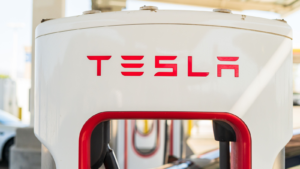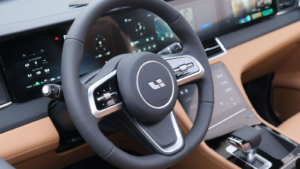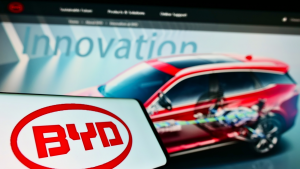Under the Inflation Reduction Act, the present administration has implemented many measures to encourage the use of electric vehicles (EVs) on public roads. The outcome has been a more than fourfold increase in EV sales.
Apart from the U.S., China also warrants attention. Last year saw annual new EV sales of 9.49 million in the country, the highest in the world by a stretch. Hence, it will come as no surprise that two out of the three stocks we profile are from China. Nevertheless, one U.S. company has the potential to completely dominate the industry. As a result, it completes our selection of top EV stocks. All three hold double-digit upsides, according to analysts.
Tesla (TSLA)

With almost 1.8 million units delivered for 2023, Tesla (NASDAQ:TSLA) held onto the crown of the biggest EV company. Nevertheless, Tesla supplied only a small portion of the 13.6 million electric vehicles delivered globally in 2023. There is still a lot to play for.
From a strategic point of view, Tesla wants to change its revenue mix by diversifying away from automotive revenue. It wants to focus more on energy storage and AI-based autonomous driving technology, a wise move considering recurring income potential. Additionally, Tesla also wants to capture more market segments, which is why it is introducing “Redwood,” an affordable electric car, by mid-2025.
The creation of the 20 millionth 4680 battery cell at Gigafactory Texas speaks to Tesla’s notable progress in battery technology. Tesla has also been building a lithium refinery in Texas for over $1 billion to guarantee a steady supply of lithium hydroxide for batteries.
Concerns regarding its future include the erosion of margins because of aggressive price cuts. In addition, increasing competition, particularly in China, does not help.
Analysts such as Cathie Wood remain bullish, though, highlighting the same beats we have touched upon. With a mean target price of around $208, the stock has 20% upside.
Li Auto (LI)

Li Auto (NASDAQ:LI) delivered 376,030 vehicles last year, marking a first for a Chinese emerging new energy automaker.
In addition to the 2023 milestone, Li Auto delivered a record 50,353 cars in December, up 137% year over year. The figure is another feather in Li’s cap since it went past 50,000 units in a month for the first time.
The automaker’s success is due to a strong market for its SUV models. A combination of gasoline generator and battery power differentiates the cars it sells in the Chinese luxury EV market.
Li Auto also distinguishes itself as the first profitable Chinese EV startup, with an annual net income of 11.8 billion renminbi ($1.7 billion) in its last fiscal period. Fellow Chinese compatriots, Xpeng (NYSE:XPEV) and Nio (NYSE:NIO), are still in the red. Nio distinguishes itself for its battery-swapping technology and strong relations with the Chinese government. Xpeng vehicles are also known for their fast charging capability.
However, Li Auto’s product lineup, especially its Li 9 model, earned the company a top-notch reputation. Despite competing in the luxury segment, Li Auto enjoys healthy margins, with the latest net margin figure at 829%. It is a testament to the brand and its product line.
Li Auto’s potential is reflected in its target price of around $57, which translates to an upside of approximately 71%.
BYD (BYDDF)

BYD (OTCMKTS:BYDDF) is one of the finest EV stocks this year after surpassing Tesla in 2023. It took the crown from its U.S. rival in Q4 ’23, selling 526,000 battery-powered models in Q4 versus Tesla’s delivery total of 485,000 units. It heralds a change in the EV industry.
But instead of resting on its laurels, BYD actively seeks to grow internationally. It intends to build its first production factory in Europe in Hungary and a facility in Vietnam. It already sells automobiles from the United Arab Emirates to Thailand and the United Kingdom, demonstrating a global outlook.
In addition, BYD’s battery subsidiary, FinDreams, is partnering with Huaihai Holding Group to become the leading supplier of sodium-ion batteries for small electric cars worldwide. They are building a production base in the Chinese province of Jiangsu, near Xuzhou. Because of their cost-effectiveness, sodium-ion batteries are thought to hold the key to the widespread commercialization of mass-market EVs.
The consensus recommendation of a strong buy for BYDDF, with an upside potential of 38% and an average price target of $38, reflects BYD’s strong profile in China and its leading position in the electric vehicle market.
On the publication date, Faizan Farooque did not have (directly or indirectly) any positions in the securities mentioned in this article. The opinions expressed in this article are those of the writer, subject to the InvestorPlace.com Publishing Guidelines.
Faizan Farooque is a contributing author for InvestorPlace.com and numerous other financial sites. Faizan has several years of experience in analyzing the stock market and was a former data journalist at S&P Global Market Intelligence. His passion is to help the average investor make more informed decisions regarding their portfolio.
